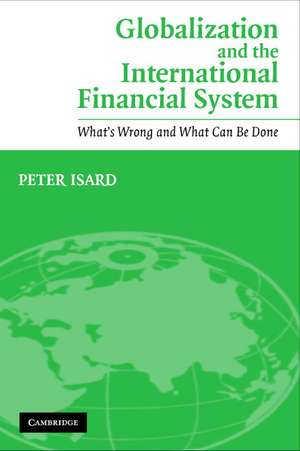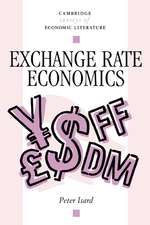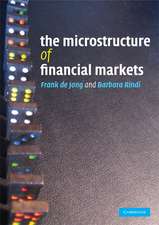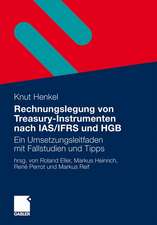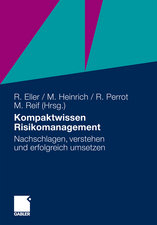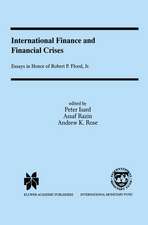Globalization and the International Financial System: What's Wrong and What Can Be Done
Autor Peter Isarden Limba Engleză Paperback – 19 dec 2004
| Toate formatele și edițiile | Preț | Express |
|---|---|---|
| Paperback (1) | 290.92 lei 6-8 săpt. | |
| Cambridge University Press – 19 dec 2004 | 290.92 lei 6-8 săpt. | |
| Hardback (1) | 469.30 lei 6-8 săpt. | |
| Cambridge University Press – 19 dec 2004 | 469.30 lei 6-8 săpt. |
Preț: 290.92 lei
Nou
Puncte Express: 436
Preț estimativ în valută:
55.69€ • 60.51$ • 46.81£
55.69€ • 60.51$ • 46.81£
Carte tipărită la comandă
Livrare economică 21 aprilie-05 mai
Preluare comenzi: 021 569.72.76
Specificații
ISBN-13: 9780521605076
ISBN-10: 0521605075
Pagini: 384
Ilustrații: 15 b/w illus. 5 tables
Dimensiuni: 153 x 228 x 26 mm
Greutate: 0.53 kg
Ediția:New.
Editura: Cambridge University Press
Colecția Cambridge University Press
Locul publicării:New York, United States
ISBN-10: 0521605075
Pagini: 384
Ilustrații: 15 b/w illus. 5 tables
Dimensiuni: 153 x 228 x 26 mm
Greutate: 0.53 kg
Ediția:New.
Editura: Cambridge University Press
Colecția Cambridge University Press
Locul publicării:New York, United States
Cuprins
List of figures, tables and boxes; List of abbreviations; Acknowledgments and disclaimer; Part I. Background: 1. Introduction; 2. The evolution of the international monetary system; 3. The international monetary fund; Part II. International Financial Crises and Obstacles to Growth: 4. Factors contributing to international financial crises; 5. The effects of crises and controversies over how to respond; 6. Perspectives on economic growth and poverty reduction; Part III. The Agenda for Reform: 7. What can individual countries do?; 8. How can the international financial system be reformed?; References; Author index; Subject index.
Recenzii
'Peter Isard brings deep scholarship and experience to the bewildering array of problems surrounding the brave new world of globalized international finance. No single volume I know does a better job of evaluating the current international financial system and its history, and drawing sensible implications for national and global policy. This book will be required reading for every serious student of the world economy.' Maurice Obstfeld, University of California, Berkeley
'A masterful survey of what ails the international financial system and how to fix it. Peter Isard writes with clarity, objectivity, and good sense. Anyone interested in the ongoing debate on globalization - and in particular, on the changing role of the IMF in the system - will find this book worthwhile reading.' Morris Goldstein, Institute for International Economics, Washington, DC
'Peter Isard provides a thoughtful and thorough review of the accomplishments and challenges of the international financial system and its principal multilateral institution - the International Monetary Fund - in an era of inevitable, rapid globalization. He blends crisp analysis with deep institutional knowledge to produce an insightful and valuable tour de force.' Edwin M. Truman, Institute for International Economics
'This book is a wonderful blend of economic analysis and front line experience with the mysterious world of international finance A serious read, it takes on two great problems of our times, recurrent financial crises and the failure of financial and economic development and sets out what we do and do not know about these problems. The IMF is a prominent player in this game and Isard provides an even handed and thorough explanation of what it does and why. Globalization is much maligned but little understood. This book provides a concise and accessible path to understanding.' Michael Dooley, University of California, Santa Cruz
'… it is important … there is a general sense that the international financial architecture needs serious reform … Secondly, how do we deal with sovereign financial distress without running up against 'nationalist resistance' as well as extra-economic issues such as national security and political governance? Thirdly, given the global nature of the desired reforms, how will the new financial architecture deal with issues of accountability and representation, as whatever shape the reform takes has crucial implications for many people? Isard's thesis could be summarised thus: globalisation, and in particular economic globalisation, has speeded up large international capital flows with greater possibilities for financial crisis, to which the international system is prone because a host of things are wrong with the way the current international financial architecture is shaped … Globalisation and its consequences, not just for the financial system, but also for areas such as energy, the environment, migration, public health, etc. will be issues for debate for some time to come and rightly so. In that context, Isard's contribution is a useful and recommended addition.' Development Policy Review
'A masterful survey of what ails the international financial system and how to fix it. Peter Isard writes with clarity, objectivity, and good sense. Anyone interested in the ongoing debate on globalization - and in particular, on the changing role of the IMF in the system - will find this book worthwhile reading.' Morris Goldstein, Institute for International Economics, Washington, DC
'Peter Isard provides a thoughtful and thorough review of the accomplishments and challenges of the international financial system and its principal multilateral institution - the International Monetary Fund - in an era of inevitable, rapid globalization. He blends crisp analysis with deep institutional knowledge to produce an insightful and valuable tour de force.' Edwin M. Truman, Institute for International Economics
'This book is a wonderful blend of economic analysis and front line experience with the mysterious world of international finance A serious read, it takes on two great problems of our times, recurrent financial crises and the failure of financial and economic development and sets out what we do and do not know about these problems. The IMF is a prominent player in this game and Isard provides an even handed and thorough explanation of what it does and why. Globalization is much maligned but little understood. This book provides a concise and accessible path to understanding.' Michael Dooley, University of California, Santa Cruz
'… it is important … there is a general sense that the international financial architecture needs serious reform … Secondly, how do we deal with sovereign financial distress without running up against 'nationalist resistance' as well as extra-economic issues such as national security and political governance? Thirdly, given the global nature of the desired reforms, how will the new financial architecture deal with issues of accountability and representation, as whatever shape the reform takes has crucial implications for many people? Isard's thesis could be summarised thus: globalisation, and in particular economic globalisation, has speeded up large international capital flows with greater possibilities for financial crisis, to which the international system is prone because a host of things are wrong with the way the current international financial architecture is shaped … Globalisation and its consequences, not just for the financial system, but also for areas such as energy, the environment, migration, public health, etc. will be issues for debate for some time to come and rightly so. In that context, Isard's contribution is a useful and recommended addition.' Development Policy Review
Notă biografică
Descriere
This book discusses the problematic side of the international financial system.
